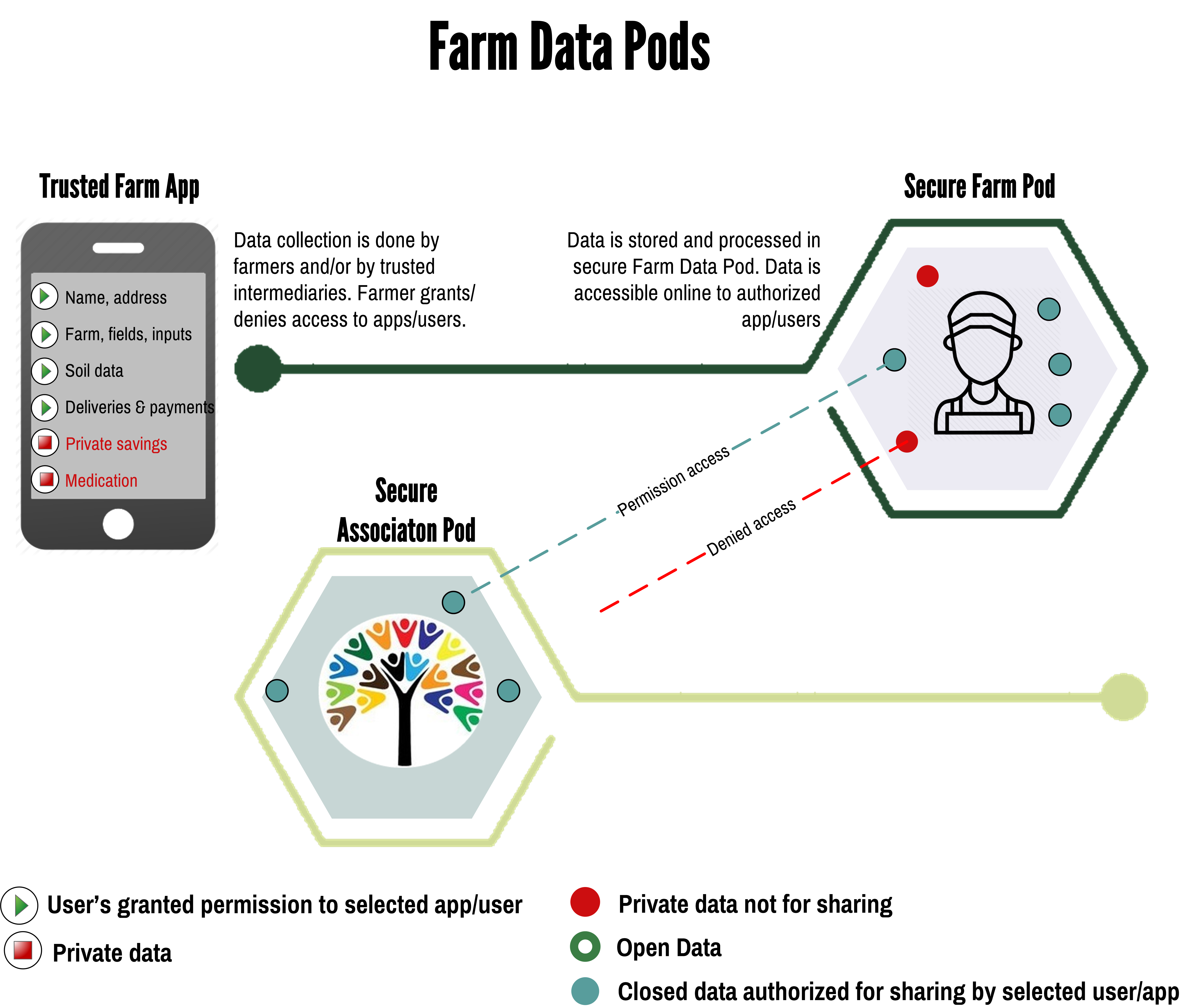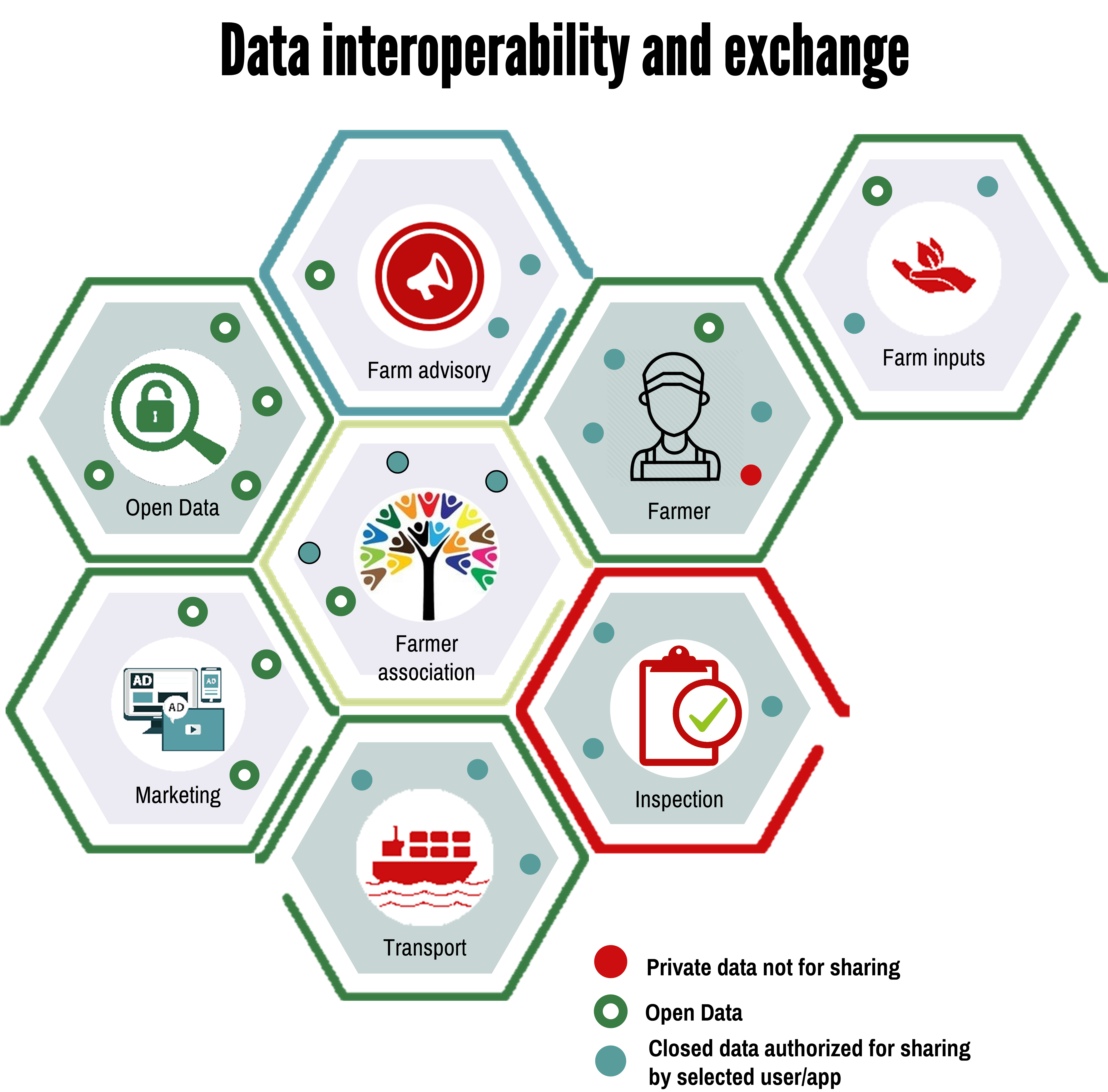Farm Data Pods
Farm Data Pods are decentralized datastores in which farmers and farm associations manage and visualize farm data. Data is owned by the farmer and can be provided to others at their request. Collection, registration and presentation of information can be done by the farmer or by intermediaries authorized by the farmer (service provider, extension officer, farm association).
Data interoperability and exchange
Data is being exchanged based on data reciprocity, with blockchain based techniques as carrier of reciprocity and data integrity. This will empower farmers and farmer organisations in data management while taking a proactive approach towards collecting, aggregating and sharing data with suppliers and customers.
- datasets and visualisations can be published in detail or in aggregated form in an open environment, making it accessible to the general public or for specific target groups (accountability, credibility, sector progress);
- datasets will be file downloadable in meta-data supported and computer readable formats (xml or json) allowing for interoperability.
- datasets can be published online in a secure environment, allowing the data-owner to share an url from which the set can be accessed/downloaded by authorized data-operators. GET-request options included allowing the data-client to pull in data by date or theme (interoperability).
For clients wishing to continue with their own managent systems, interoperability is offered as a service via Cooperative Knowledge's Data Raccoon in which clients publish their datasets from Data Raccoon's trusted server platform.
Blockchain
Farm Data Pods will be based on the open source technology of Solid. With a Farm Data Pod a farmer can decide where he/she stores farm data including production and location data, pictures, videos and contacts. This Farm Data Pod can be on a local computer at home or workplace or with an online provider of choice. The data owned by the farmers and can be moved at any time without interruption of service. A farmer van give business partners permission to to read or write to parts of the farmer POD. No more forms to be filled: business partners can read the details from your POD with your permission. Data added by a partner does not require downloading or syncing, the Farm Data Pod can be accessed from any place. It is a secure storage managed by the farmer him/herself. He/she decides who to get access to what.
Where the farmer data pod is designed for storing data and sharing data, the open source Hyper ledger Fabric Block chain is designed for creating secure commercial and efficient transactions and tracking and tracing. Difference with other block chain systems is that Hyperldger is permissioned and private and does not require high energy mining operations. (See also this article). “Permissioned” implies that not everyone can become a member, but members enroll through a “Membership Service provider” which can be seen as a set of rules governing and authentication of membership. Hyperledger Fabric also offers the possibility to create channels, allowing a group of members to create transactions that are only privately known to them and are registered only by the participants of the channel. This would also that competing value chains could make use of the same Hyper ledger, but using different channels. See also this video and this flow chart.
A normal CMS like Drupal will be used for storing non-critical information, making flexible information retrieval and presentation relatively simple.
Management dashboards
Patterns, trends and correlations that might go undetected in text-based data can be exposed and recognized easier with data visualization. The dashboarding toolbox will provide various flexible tools to create selections, filters and visualisations of selected data. Views, diagrams and graphs can be stored in management dashboards. Each user can develop and manage his own dashboards.
For clients wishing to continue with their own managent systems, management dashboards are offered at the Data Raccoon server platform. Obviously in a trusted environment to which only client authorised persons have access.


